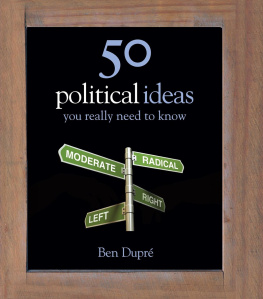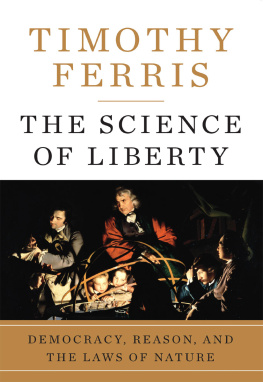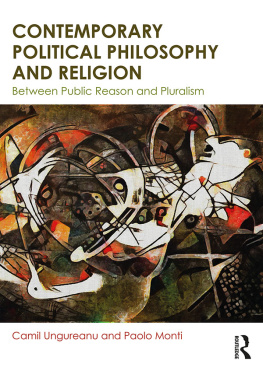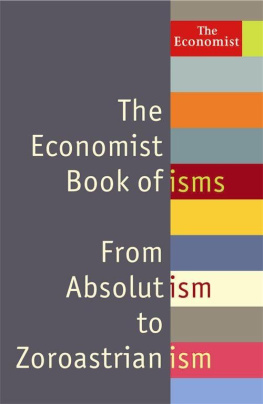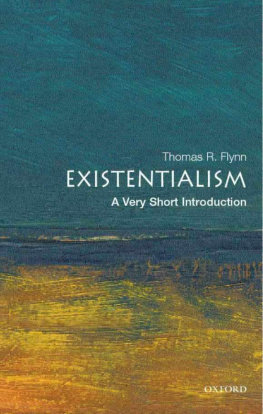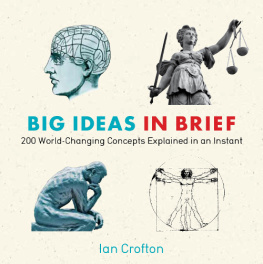big ideas
you really need to know

Ben Dupr

Introduction
Greater than the tread of mighty armies is an idea whose time has come. The French novelist Victor Hugo understood the combination of substance and timing that come together to form an idea that really shakes things up that is destined to be big. But bigness can come in many guises: big and beautiful, big and ugly, big and scary. Ideas can be big in all these ways and so may be admirable, despicable or intimidating. Ideas of all these kinds are represented here.
The aim of philosophy, Adam Smith suggested, is to lay open the concealed connections that unite the various appearances of nature. In the light of such lofty ambitions, it is little surprise that philosophers have provided some of the most spacious of big ideas. A selection of these, covering two-and-a-half millennia from Platonism to existentialism, is included here. No less profound is philosophys frequent adversary and occasional ally, religion a spiritual path to a different kind of truth. Faith, soul and other central ideas of religion are fundamental in understanding how people judge the value and meaning of life. At the same time, positions taken in opposition to religion, such as atheism and secularism, have forged new and distinctive perspectives on the world.
The American humorist Will Rogerss joke about communism being like prohibition its a good idea but it wont work is at least half wrong on both counts: for better or for worse, communism is probably the most successful political ideology ever to be planned on paper and realized in fact. Communism is joined here by other seminal ideologies, including conservatism, liberalism and republicanism. Much darker is the legacy of some other political ideas, notably fascism and racism, which have left an indelible stain on human history.
In the last part of the book transformative ideas are drawn from the arts and science. The artistic trajectory of human culture is traced through dominant movements such as classicism, romanticism and modernism. On first encounter, scientific ideas such as relativity and quantum mechanics may appear forbidding, but their overall architecture is accessible and awesome. One cannot help but marvel at minds that could encompass such things.
There are many wonderful ideas in this book and some dreadful ones too. If the reader is not left with some sense of awe, the fault is surely mine: the ideas are still big, its just the writing that got smaller. Many thanks to my unflappable editor-cum-designer, Nick Hutchins, and for the support and friendship of my publisher, Richard Milbank, whose bright idea this was in the first place. Finally, thanks to my own four best and brightest ideas, who huddle together ever closer in the diminishing space left by my expansion.
Platonism
The safest general characterization of the European philosophical tradition is that it consists of a series of footnotes to Plato. While undoubtedly more pithy than true, the fact that a philosopher of the stature of A.N. Whitehead could make such a claim points to the astonishing awe in which later philosophers have held Plato, a citizen of Athens who was born nearly 2500 years ago.
The chief error in philosophy is overstatement, Whitehead pointed out earlier in his Process and Reality (1929) ironically, at least in relation to the above-quoted remark, which is manifestly an exaggeration. But while Whitehead may fail to give subsequent Western philosophy its due, it is unquestionably true that Plato cast a huge shadow over later thinkers and that many of them developed and refined their ideas in creative interaction with or reaction to those of Plato.
In the course of some 35 dialogues, written over half a century, we see a range of doctrines ethical, political, aesthetic, among others evolving and maturing, and the term Platonism may refer to some or all of these ideas. At the core of his philosophy, however, is a strikingly original metaphysical theory that assumes the existence of a realm of eternal and unchanging realities, distinct from the shifting world of everyday experience. These entities are both the cause of everything and the source of all value and meaning, and exploring their transcendent nature and the manner in which we gain knowledge of them is the most distinctive part of Platos philosophy. Accordingly, it is this aspect of his work that can most precisely be called Platonic, and it is by extension from this peculiar conception of ultimate reality that the name Platonism is sometimes applied to other theories that are realist (idealist) in character. These typically assert that abstract entities, especially mathematical ones, exist outside time and space, independently of our perception or experience of them.
The theory of Forms The motivation for Platos extreme realism is dissatisfaction with what purports to be knowledge of the world around us, where everything is imperfect and changeable. How can we know what tallness is when a tall person is short next to a tree? Or what redness is when an apple that appears red in daylight looks black in the dark? Such things, Plato concludes, are the objects not of knowledge but of opinion or conjecture. What is known must be perfect, eternal and unchanging, and since nothing in our everyday experience (in the realm of becoming) fits this description, there must be a transcendent realm of being where there are perfect and unchanging models or paradigms. These are what Plato calls Forms or Ideas, and it is by virtue of imitating or copying them that things in our experience are the way they are. So, for instance, it is by copying the Form of Justice that all particular just actions are just.
And how, we may wonder, do we gain knowledge of these transcendent Forms, if all that is available to us through our senses is poor imitations or copies? Platos surprising answer is that we must have come to know the Forms when we were in some earlier state and that what we are engaged in now is a process not of learning but of recollection. On this basis Plato develops a thoroughgoing dualism, in which our immortal souls exist prior to occupying physical bodies. It is the process of embodiment that encumbers the soul and causes it to forget the knowledge that it gained from previous direct contact with Forms in the realm of being.
We ought to fly away from earth to heaven as quickly as we can; and to fly away is to become like God, as far as this is possible; and to become like him is to become holy, just, and wise.
Plato, Theaetetus,C.369BC
Platos cave
Platos complex and many-layered conception of knowledge and truth is illustrated by the most famous of the many images and analogies he used: the Allegory of the Cave. The essence of the story, which appears in his greatest and most influential work, The Republic , is as follows:
Imagine you have been imprisoned all your life in a dark cave. Your hands and feet are shackled and your head restrained so that you can only look at the wall straight in front of you. Behind you is a blazing fire, and between you and the fire a walkway on which your captors carry statues and all sorts of objects. The shadows cast on the wall by these objects are the only things you and your fellow prisoners have ever seen, all you have ever thought and talked about. Now suppose that you are released from your shackles and free to walk around the cave. Dazzled at first by the fire, you will gradually come to see the situation of the cave properly and to understand the origin of the shadows that you previously took to be real. And finally you are allowed out of the cave and into the sunlit world outside, where you see the fullness of reality illuminated by the brightest object in the skies, the Sun.


